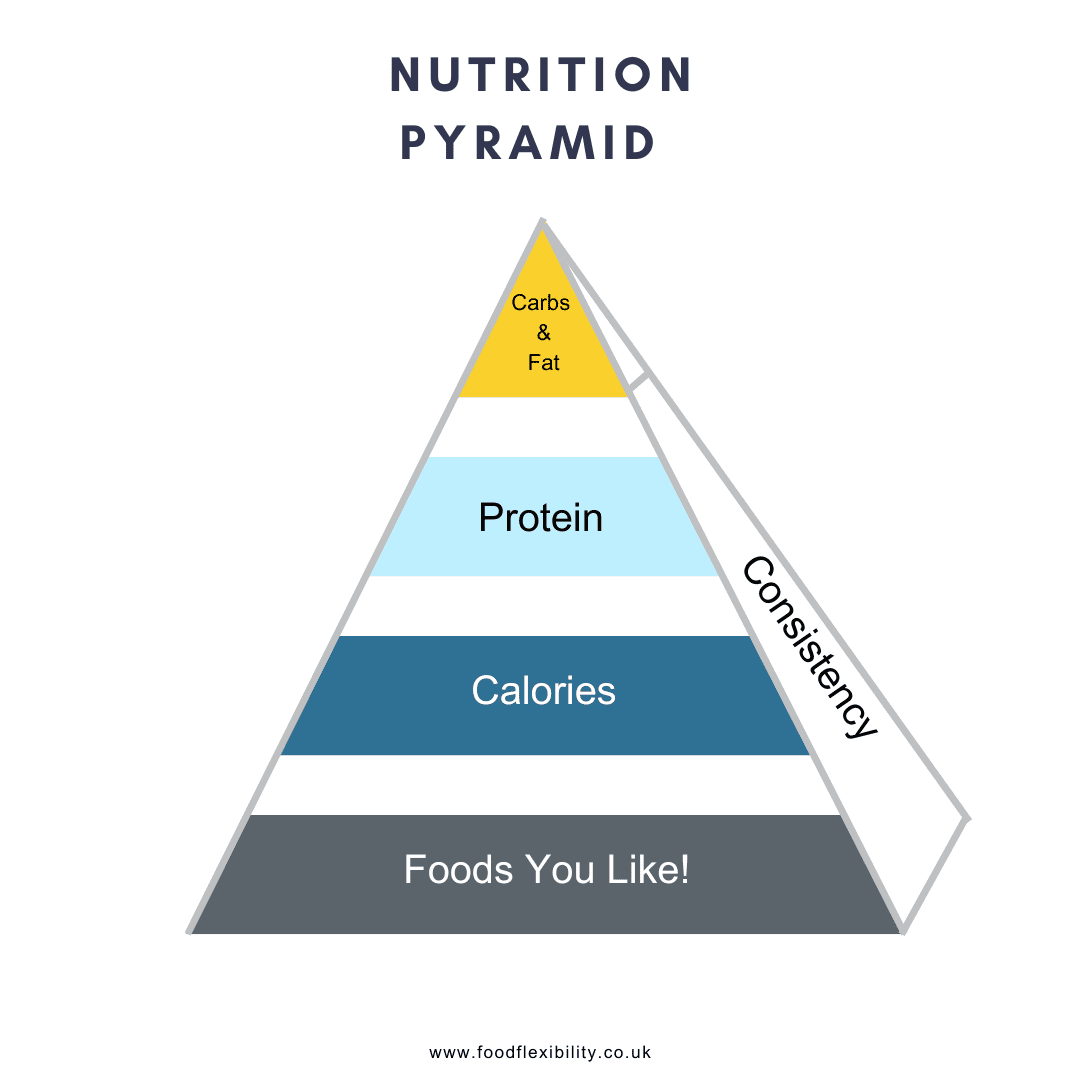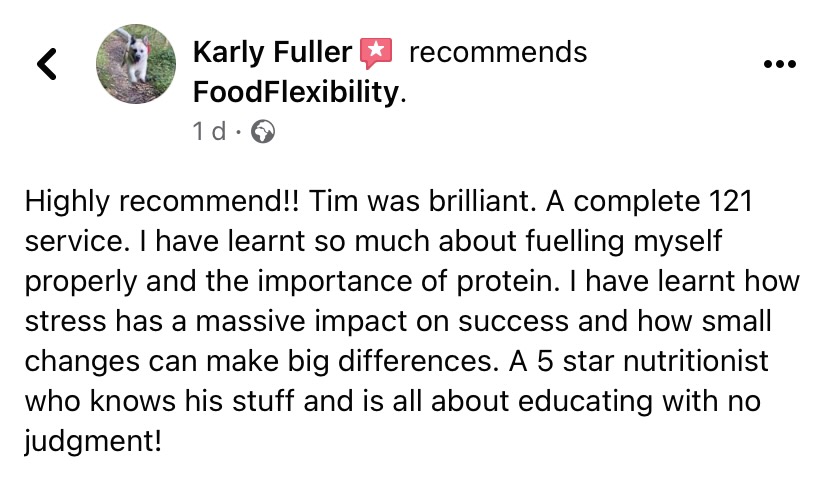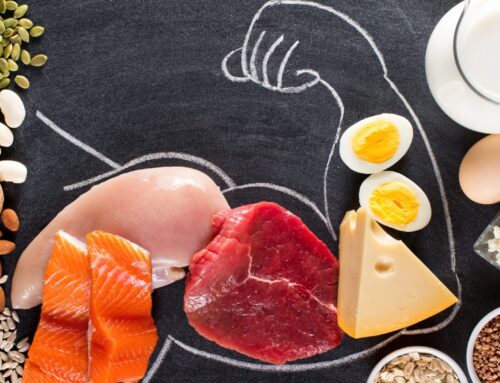Why you don't need glucose monitoring for fat loss
There is a lot of hype right now about glucose monitoring. Is it the magical solution to fat loss everyone has been looking for?
Perhaps you saw a celebrity endorsing a glucose monitor (even though they don’t use one themselves).
Or a seemingly credible doctor with a big advertising budget behind him.
Maybe you haven’t got a clue what a CGM is!
Well, this blog is here to help you understand what really matters for fat loss.
That way you can avoid falling for clever marketing or expensive products you don’t need.
So why all the fuss about glucose monitoring and CGM’s?
CGM stands for Continuous Glucose Monitor
They’re very helpful for monitoring blood glucose levels in people living with diabetes or at risk of developing it.
Their main purpose is to help them manage blood sugar. That’s because their body does not produce the insulin it needs to absorb nutrients from food which can ultimately be fatal.
If your body can produce insulin normally then you have no need for continuous glucose monitoring whatsoever.
Blood glucose levels are estimated by the CGM rather than being measured directly so (as I understand it) many people living with diabetes still take finger prick blood samples to validate the accuracy of the CGM’s readings.
Glucose Monitoring and Insulin
It’s common for people wanting to sell you a continuous glucose monitor to claim that because carbohydrates spike your insulin levels (so does protein by the way) that you will be unable to burn fat.
They’ll also state (incorrectly) that carbohydrates make you insulin resistant*.
*Insulin resistance is where your body’s cells don’t respond properly to the insulin it makes which affects control of blood sugar levels .
That’s actually the wrong way around though.
Primarily, insulin resistance happens because of excess visceral fat.
Fat gain over time, which can only be caused by overeating is what leads to insulin resistance. As explained by Alan Aragon here.
The Zoe Diet is Wrong About Glucose Monitors
Of course the Zoe diet is not the only product to be making claims about glucose monitoring but it’s the one I get asked about the most right now.
Tim Spector is a highly charismatic and intelligent individual.
That doesn’t make him correct about everything though.
In fact I’d go as far as saying a lot of his ‘Zoe Diet’ is marketing BS!
Why does it get me so riled up? Well, as a nutrition coach I see a lot of people terrified to eat certain foods.
Foods like fruit.
Nobody ever got fat from eating fruit!
But look at any of the advertising for the Zoe project and you see clickbait titles like ‘don’t eat this’ or ‘how this one device (a CGM) changed my life’.
What works for fat loss is a diet that is based on whole foods which is calorie appropriate and contains plenty of fruits and vegetables.
People are profiting from the idea that isn’t enough though and that’s irresponsible.
Yes your blood sugar response to eating certain foods will be different to mine but that’s normal.
People promoting continuous glucose monitors provide a convincing argument but when you look at that argument critically it doesn’t stack up.
Here’s Layne Norton dong that very passionately.
The reason this whole thing gets me (and Layne) so fired up is that it confuses people, gets them overcomplicating nutrition and even damages their relationship with food.
Just like my old nutrition lecturer Tom describes in this Instagram post.
We’re not the only ones either.
I got a fantastic email from Zöe, a Health coach for the NHS, after I sent out the draft of this article to my email list (which you can subscribe at the bottom of this page) :
“Personally, I’m still seeking my holy grail! I looked at “ZOE”, but it’s ludicrously expensive!
Through the ‘covid’ scandal I followed Tim Specter and had respect for him. When I saw him promoting ZOE I felt pulled toward it, but it’s out of my budget! But then when Davina jumped on the bandwagon, I was definitely out!! Ha ha…
I’m very interested in metabolic health and follow FAST800, which I find convenient and tasty. I suffer a bit, as many women of my age do with fatigue and aches and pains. I exercise every day, and battle fat. But I eat too much, I’m a Scooby Doo, I love to snack (albeit good snacks), however I dress it up I over eat.
I love your reference to the guy in the video, he echoed my thoughts.
My biggest concern, both professionally and personally, there is too much conflicting information out there. People are lost! They have no idea what to do anymore! They’re so confused! After the garbage that came out of our TVs and social media through covid times, they are absorbing everything and are saturated to the point where they’re just finding excuses to ignore the problem. Sorry, I digress…
I guess we’re on the same side now, battling myths and trying to find the way forward. Great, great article though, I really enjoyed reading it! It’s even given me food for thought (I always remain open minded about everything), and I’ll give those activities a go, see if I can be more ‘Daphne’ and less ‘Scooby-Doo’! Ha ha..”
What brilliant self awareness around her snacking!
As you can see we are all susceptible to looking for a seemingly easy solution because eating whole foods in the right proportions is hard work and involves an investment in both time and effort.
People with big marketing budgets are trying to woo people into quick fixes and it pisses me off!
Anyway, rant over.
I feel better now…
Why Insulin Causes Fat Storage but Doesn’t Make you Fat
I’ve written an entire article explaining this concept here.
Ultimately your body produces insulin every single time you eat.
That signals the nutrients in your food to be stored and the amount of insulin scales to the type and quantity of food.
Storing the nutrients from your food is essential because your body always needs energy but you’re not always eating (or shouldn’t be at least).
What people promoting the use of CGM’s always miss is that whilst insulin triggers fat storage temporarily, you need to eat more calories than you consume, consistently, to gain body fat more permanently.
Glucose Monitoring Doesn’t Matter for Fat Loss
People wrongly assume that if you eat a bunch of carbs every day your body becomes swamped in insulin leaving levels chronically high.
‘Influencers’ jump to the wrong conclusion, that a high carb diet means you are permanently in a state of fat storage leaving you unable to burn fat.
Thankfully for those of us who like bread, that’s not how it works…
Ultimately if you eat carbs, you burn carbs. If you eat fat, you burn fat.
It’s like humans have evolved over millennia to use the food available so that we don’t starve to death…
Because fat loss fundamentally revolves around the principle of creating a calorie deficit, otherwise known as expending more calories than you consume.
Monitoring glucose levels isn’t directly related to this fundamental principle of energy balance.
Pros and Cons of Continuous Glucose Monitoring
You’ve already seen the benefits for those living with diabetes.
I guess it’s not fair to say there are zero benefits to using a CGM if you are healthy.
Just like getting a new smartwatch and monitoring your steps makes you more aware of how active you are (or are not) monitoring how your body reacts to certain foods might bring more awareness which could influence food choices.
But worrying about the normal and natural reaction of your body to eating (spiking insulin) without understanding why that’s a good thing is going to cause more damage than good.
At best, it’ll lead to frustration when you keep overeating ‘low GI’ foods but don’t lose weight.
At worst, you’ll ruin your relationship with food.
A much cheaper and more effective way to enhance food awareness is through a food dairy.
Take a notepad and pen and simply write down what you eat every day.
After 7 days use this short exercise to assess that diary for yourself.
Using a calorie counting app like MyNetDiary is also free and a great way to learn about food.
Should you Use a Glucose Monitor for Fat Loss?
Successful fat loss needs a holistic approach that tackles stress management, sleep quality, food quality and individual variations in metabolism (some people need to eat less than others to lose fat).
Not to mention the psychological and behavioural factors you need to hook up like motivation, adherence, and consistency.
No doubt, there are some scientific studies which suggest a correlation between glucose management and weight management.
As with any science, it’s often difficult to determine if there was a direct impact from CGMs.
Now I’m not going to say a CGM will never help you lose fat but what I am saying is there are cheaper, safer, and more effective means. Perhaps one day research will prove me wrong but for now the evidence overwhelmingly supports a calorie deficit being the primary driver of fat loss.
If you are considering a CGM for any purpose, it’s important to consult with a healthcare professional to determine if it’s appropriate for your specific health goals and needs.
Remember, while CGMs can offer valuable insights for certain health conditions, they are not the magic answer to fat loss.
Eating well, exercising regularly, and managing stress are all hard to do consistently but the truth is they’re essential for successful and sustainable fat loss.

Still Confused About Fat Loss?
A good coach can help to individualise your approach and help you see the wood from the trees.
Yes, that is me blowing my own trumpet but it’s also what my amazing client Karly had to say:

Very kind words from Karly who worked her backside off throughout her fat loss journey despite a highly demanding job.
All that leaves me to say is thanks for reading!
As a thank you for getting this far…
Help Yourself to Some Free Resources
Try my FlexibleFatLoss email course
Read my Ultimate Guide to Fat Loss
Or if you’d like a personalised approach:
Have you Got a Question I didn’t Answer?
Just comment below
- What insights did you have after reading this article?
- What have you taken away that you can put into action tomorrow?
- How did it help you see fat loss differently?
- Did I get something wrong or confuse you?
Tim
References
Fat loss depends on energy deficit only, independently of the method for weight loss: https://pubmed.ncbi.nlm.nih.gov/18025815/
WHO Factsheet – What causes obesity and overweight: https://www.who.int/en/news-room/fact-sheets/detail/obesity-and-overweight
Calorie counting does work: https://pubmed.ncbi.nlm.nih.gov/30816851/
GI doesn’t impact insulin sensitivity: https://pubmed.ncbi.nlm.nih.gov/25514303/
Carbs and GI have no effect on fat loss: https://pubmed.ncbi.nlm.nih.gov/26530933/
Currently no evidence for low GI diets on cardiovascular disease, blood lipids or blood pressure: https://pubmed.ncbi.nlm.nih.gov/28759107/



Tim,
Great article, it makes me wonder if CGM is gaining such traction due to the amount of sugar there is in food and snacks in general. I recently started really looking at sugar content of foods and it is crazy… the only way to avoid it it to buy fresh fruit, veg and meat make your own sauces…. but a lot of that isn’t convenient. Convenient food often means high sugar content. What are your ‘goto’ sauces for mixing up food flavour while keeping aware of Hugh sugar content?
Thanks for the question Dominic,
I had replied previously but for some reason it’s been deleted…
The things to look out for are added sugars rather than those which are naturally occurring as you say.
If it helps, there’s some great information on sauces on the British Heart Foundation website:
https://www.bhf.org.uk/informationsupport/heart-matters-magazine/nutrition/sugar-salt-and-fat/sauces-ooh-saucy
I think that article strikes a nice balance by giving some solid options for shop bought options.
In terms of daily sugar content, the advice varies but the same article states a sensible recommendation for daily sugars as follows:
“The recommended daily maximum of free sugars is 30g (about seven teaspoons)”
So, awareness is key but also remember the main reasons to avoid sugar if you meals are otherwise balanced (mainly wholesome foods, rich in protein and fibre and full of fruits and vegetables) are to prevent excessive calorie intake and to look after your teeth.
Hope that helps but please let me know if you have any other questions.